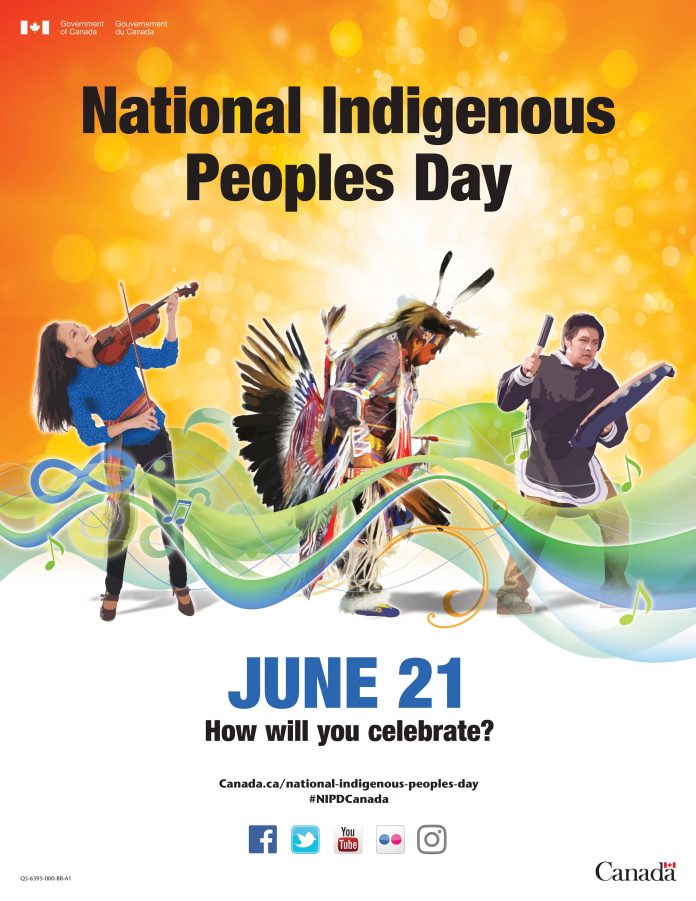June 21 marks National Indigenous Peoples Day, and while the usual celebrations have been cancelled due to COVID-19, there are still many ways to celebrate and learn about Indigenous peoples across Canada online and at home. Below are a series of resources to help Canadians get educated and celebrate Indigenous communities and their culture, not just during Indigenous History Month, but all year long. There are also resources for Indigenous peoples in Muskoka and North Simcoe, including virtual celebrations, business resources, and health and wellness services.
Resources to celebrate and learn more about Indigenous communities and their history:
- Whose Land tool: Whose Land is an app and website that maps out traditional Indigenous territories across Canada. It can help users determine which territory their home or business is on, find information for land acknowledgements, and learn about the different treaties and agreements signed across the country. The team behind the Whose Land worked with Native Lands to develop the online resource.
- National Centre for Truth and Reconciliation: The National Centre for Truth and Reconciliation is home to the statements, documents and other materials collected by the Truth and Reconciliation Commission of Canada (TRC). The TRC gave those impacted by residential schools the opportunity to share their experiences. Now, the National Centre for Truth and Reconciliation offers resources and educational materials to promote reconciliation and healing and to make sure the history of residential schools in Canada is not forgotten.
- Indigenous Atlas of Canada: The Indigenous Atlas of Canada includes reference maps of Indigenous Canada and a glossary of common Indigenous terms along with information about Inuit, Métis and First Nations peoples and Truth and Reconciliation. Readers can access the atlas online or purchase a copy from Indigo or Amazon.
- Resources from the Government of Canada: The Government of Canada offers a number of resources for National Indigenous Peoples Day and Indigenous Heritage Month, including a Kids Stop that lists activities and educational resources to help children learn more Indigenous peoples’ culture and history. The government also released an Indigenous reading list, a list of virtual celebrations across the country and other resources.
- Canadian Museum of History: The Canadian Museum of History offers many ways to learn more about Indigenous communities and culture through their online exhibitions and resource centre. In honour of National Indigenous Heritage Month, the museum is posting Indigenous-themed activities such as how to make fry bread and a way to learn about Métis-style beading without the beads. Their Museum at Home page pulls together many of their virtual resources, including a documentary about the Canada C3 expedition, which depicts a coast-to-coast journey exploring Indigenous communities across Canada.
- Summer Solstice Indigenous Festival: The virtual edition of the Summer Solstice Indigenous Festival comes to a conclusion on National Indigenous Peoples Day, but videos of workshops and other festival programming will be available on Summer Solstice’s Youtube channel and Facebook page. The festival is also offering a virtual marketplace to help support Indigenous small businesses.
- Read books by Indigenous authors: Companies like GoodMinds.com, Inhabit Books and Strong Nations publish and sell books by Indigenous authors, offering reading materials for people of all ages.
- Support Indigenous businesses: Use the Indigenous Business Directory or the Canadian Council for Aboriginal Business’ list of members to find Indigenous-owned businesses.
Resources for Indigenous individuals and businesses:
Virtual celebrations and other cultural resources
- Social Distance Powwow: The Summer Solstice Indigenous Festival collaborated with the Social Distance Pow Wow Facebook Group for the Summer Solstice Powwow from June 19 to 21. Head over to the Facebook group to see video entries from participants and keep an eye out to see the winners, which will be announced at 7 p.m. on National Indigenous Peoples Day.
- Virtual celebrations for National Indigenous Peoples Day: Along with the Summer Solstice Indigenous Festival, a number of online events are happening in communities across the country.
- First Voices: First Voices is a set of web-based tools and services created to support Indigenous peoples “engaged in language archiving, language teaching and culture revitalization.” They offer a variety of ways to explore Indigenous languages, including resources designed for children.
- Ahkameyimok Podcast with National Chief Perry Bellegarde: Assembly of First Nations National Chief Perry Bellegarde leads discussions on issues that affect Indigenous communities.
Business resources
- Government relief for Indigenous businesses: The Government of Canada is providing short-term, interest-free loans and non-repayable contributions to First Nations, Inuit, and Métis businesses. Visit the Government of Canada website to apply for support.
- Indigenous Tourism Ontario: Indigenous Tourism Ontario provides Indigenous businesses with access to marketing, sales, and business development programs. They invite any person or organization with an interest in advancing Indigenous tourism in Ontario to become a member.
- Indigenous Business Directory: Register with the Indigenous Business Directory, which aims to increase the visibility of Indigenous businesses while also allowing businesses to compete for federal government contracts that are allocated to Indigenous businesses.
- Canadian Council for Aboriginal Business: The Canadian Council for Aboriginal Business works to strengthen Indigenous communities by supporting Indigenous-owned businesses. They offer various business development tools to their members along with certifying Aboriginal-owned businesses.
Health and wellness services and resources
- Protect Our Elders campaign: The Protect Our Elders campaign was created by the Alexis Nakota Sioux Nation to encourage youth to help protects their elders from COVID-19. Visit the campaign website for resources.
- Free COVID-19 activity book and story book for children:GoodMinds.com has released a complimentary activity book and story book about Nuttah & Kitchi, fraternal twins from Skownan First Nation who work to help their family stay safe from COVID-19.
- Assembly of First Nations COVID-19 Resources: The Assembly of First Nations has put together a collection of resources and materials for Indigenous people and communities to access during the COVID-19 pandemic.
- Barrie Area Native Advisory Circle: The Barrie Area Native Advisory Circle is a social health and planning organization that provides a range of services to Indigenous peoples throughout North Simcoe County and Muskoka. They offer help with childcare, social development and support for seniors and families.
- Hope for Wellness Help Line: The Hope for Wellness Help Line offers immediate mental health counselling and crisis intervention for all Indigenous peoples across Canada. Hope for Wellness can be accessed through the help line at 1-855-242-3310 or through chat online at hopeforwellness.ca.
- National Residential School Crisis Line: A National Residential School Crisis Line has been set up to support former residential school students. The 24-hour crisis line can be accessed at 1-866-925-4419.








